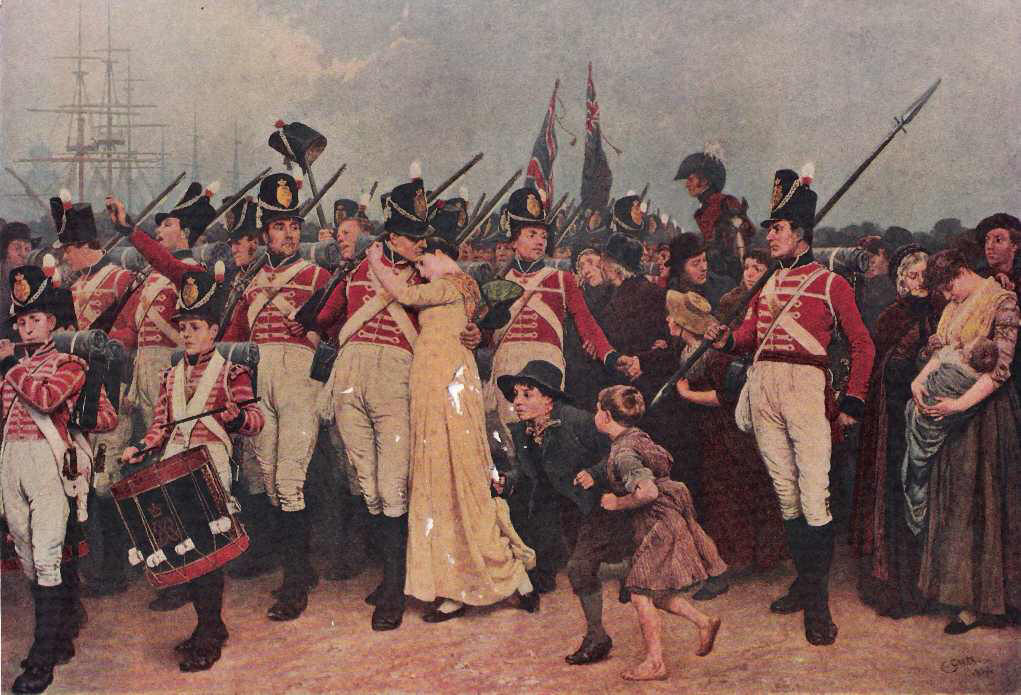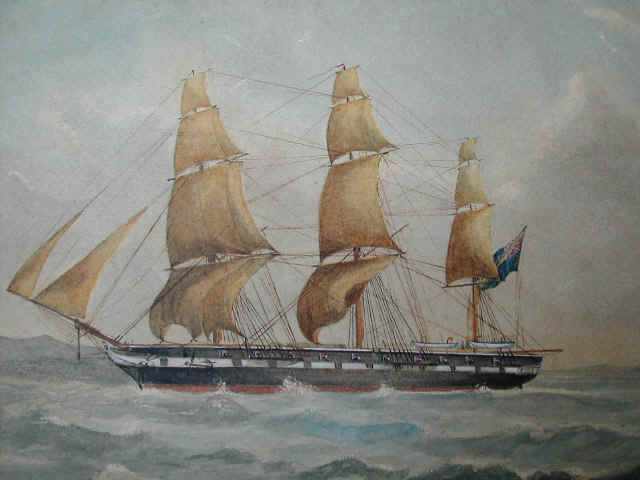Fighting Napoleon
Five Sons - Captain Samuel
Favell - Commander Thomas Favell - Ensign Favell
Five Sons
From
“The Gentlemans Magazine” November 1840: -
Obituary - Lately. At Cambridge, aged 93, Mrs Favell. She was the mother
of sixteen children, seven of whom died in infancy. Five of her sons devoted the best part
of their lives to the service of their country ; three of them fell in action, viz. Capt.
John Favell, at the battle of Leyden, in the Duke of York's expedition in Holland :
Captain Samuel Favell, at the battle of Salamanca, during the Duke of Wellington's
memorable campaign in the Peninsula ; and Wm. Anthony Favell, in the battle of Toulouse.
Lieut. James Favell, R.N. died whilst engaged in a government expedition to survey the
shores of Africa ; Capt. Thomas Favell, R.N. was many, years in active service at sea and
in several engagements. When the national rejoicings took place upon the declaration of
peace, in 1815, Mrs. Favell displayed alike her patriotic and maternal feelings in a
transparency inscribed—" I rejoice for my country, but mourn for my sons."

Captain Samuel Favell
The death of Captain Samuel Favell in an
excerpt from “A narrative of the adventures of Samuel Wray now living at Kempston,
Bedfordshire, from the time of his volunteering for that parish in 1796, till his return
to England in 1815”.
We formed close column on a large hill. As we stood in close column, a ball took off the
arms of a private in our regiment, who received a perfect cure and was sent home a
sergeant, and singular to relate he was the only person wounded. We moved further around the hill, and it being a
very hot day two or three of our men went for water.
Captain Favell of my own company met them and took their canteens from them. He threw the water away and took the men to the
Colonel and petitioned to have them flogged; but he told him he would not have them
punished, for we should have something else to do. In
a few minutes we were wheeled round the hill, and the French fired at us. We had to get over stone walls till we got upon a
level. The French were upon the hills, and we
commenced firing. The first thing we observed
was that Captain Favell was shot through the body. He
walked by us, and the men said ‘you cannot get us flogged now.’ The Captain died that night.

Commander Thomas Favell RN
Obituary from "The
Gentlemans Magazine" 1835: -
London & its vacinity.
July 27th at Poplar. Thomas Favell esq. Commander R.N. He served as Masters
Mate of the Minorca Sloop, in the Mediterranean, in 1809, became a Lieut 1809, and a
Commander 1827. He was the fifth brother who has died in his Majesty's service.
(The picture shows a Brig-Sloop in the same class and of the same date as the
Minorca)
Ensign Favell
During the French Revolutionary
War a British force was sent to the Low Countries to defend Holland against the French
Revolutionary army. The battle at
Egmont-op-Zee took place in 1799. The fate of
Ensign Favell is described in an extract from “Reminiscences of my military life from
1795 to 1818 by Liutenant Colonel Charles Steevens, formerly of the 20th
Regiment”. (An Ensign was the
lowest rank of Commissioned Officer). This is not William Anthony Favell who died at
Toulouse in 1814 (who was also an Ensign) and therefore not one of the five brothers
above.
The regiment was
afterwards engaged in the action of the 2nd October, and had two officers wounded and they
were very warmly engaged on the 6th October near Egmont-op-Zee, in which action they had
two officers killed, and eight wounded in the two battalions. I was amongst the number, being very severely
wounded, and afterwards taken prisoner by the French cavalry at Egmont-op-Zee on the
morning of the 8th, our Army having commenced their retreat on the evening of
the 7th, leaving their own wounded behind, as well as the wounded prisoners.
I was
Lieutenant of grenadiers at the time I was wounded, but had command of a battalion company
and Ensign Favell and myself, who were the only officers of that company, were both
wounded before a single man of the company were hit, which was a proof that we were picked
off by the French rifle- men, numbers of which they had in front of their Army. We, unfortunately, had but few in front of ours,
and they, I believe, belonged to the 6oth Rifles. The riflemen the enemy had gave them a
great advantage over us, and in consequence of their having so many light troops many of
our officers were picked off by them, and the proportion of killed and wounded officers
was very great but we are wiser now, and can show as good a front as the enemy whenever we
have an opportunity to cope with them.
I
fortunately was carried off the field by a private of the 15th Light Dragoons. I was placed on his horse in front of him,
seated sideways, with a blanket thrown round me, and a man led the horse, as he was very
high spirited, and I could not bear him to go beyond a foot's pace, for my wound being in
the leg I suffered much pain from the position in which I was placed. I recollect offering the dragoon some money, but
he refused to take anything on my arrival at the town of Egmont-op-Zee. I was there placed in a house upon a bed of hay,
on the floor, with other wounded officers of my own regiment, where I was taken prisoner
on the 8th.
The wounded
of course passed an anxious night on the 7th, expecting the enemy to enter the town every
moment. As soon as daylight appeared in galloped the French cavalry, sword in hand. One came into the room where I was lying, attended
by my servant, Private Thomas Lamb, who was taken prisoner with me, as, when I was left
behind at Egmont-op-Zee. The marked
difference between the uniforms of the officers and privates at that time also accounted
for so many of the former being easily distinguished and picked off. I fell in with him once or twice in England
afterwards, as I always found him out whenever I happened to be quartered in the same
place with the 15th Dragoons, feeling very grateful for the care he took of me.
He would not leave
me, but was determined to share my fate. Immediately the Frenchman saw me he said "
Qui tes vous " ? I answered "
Un officer Anglais. He then said " Les
officiers sont braves, mais les soldats ne le sont pas," and taking up my canteen
drank part of its contents, which consisted of either white brandy or hollands. He then left the room. Others came in, amongst whom was a French Officer.
I was glad to see him, as I expected to be
well used, and I found it to be the case for the French officers treated us prisoners with
the greatest humanity and attention.
Soon after
the French entered Egmont-op-Zee preparations were made to remove the wounded out of the
town towards the rear. Poor Favell and I were put into the same open Dutch wagon, and were
taken that night to Alkmaar, where we were put into a hospital for the night. Here our
wounds were dressed (I mean Favells and mine, for my servant was not wounded). There were
a great many Dutch females in the hospital, making bandages and assisting the wounded ;
some appeared to be ladies, for there were Dutch officers and men, as well as French and
English, in the hospital. The French General (Le Brun) promised that my servant should
remain with me, but it was not attended to, and poor Tom Lamb was put into prison with the
other soldiers who were taken, and I heard nothing of him for many months.
We were
about a week or ten days reaching Breda. We
were laid generally in our clothes upon mattresses, sometimes being carried into an inn.
We suffered much from the jolting of the wagons, and at one time we were obliged to halt
for a day or so to recruit our strength, for it was very fatiguing travelling so many days
in open wagons, without our clothes being taken off, and the surgeons were fearful and
apprehensive lest some of us should be thrown into a fever. The journey to Breda was very
harassing, the wounded being conveyed in boats by canal, as well as in wagons ; but being
at that time a young man (not twenty-three years of age) I was able to undergo the
hardships and fatigue to which we were exposed.
Whenever we
arrived at a town in the evening where we were to halt for the night, I being unable to
walk, was carried by the French soldiers and placed upon a mattress, either in an inn or
hospital, and the next morning carried out again and replaced in a boat or wagon, just as
it happened. One day the French soldiers were
carrying me through the streets with other wounded English officers, and a party of Dutch
insulted us by hooting, etc. The French soldiers immediately drove them off with the
butt-end of their muskets, and no doubt would have floored a few of them if they had not
made themselves scarce. The French always behaved well to us, but the Dutch were very
boorish and uncivil
Previous to
our arrival at Breda I parted with poor Favell. He
was dangerously wounded in the breast, and although we travelled together for several days
he never spoke. He was left at Amsterdam
where, I believe, he died, poor fellow. I was
many years afterwards acquainted with his brother in the 61 St Regiment.
Return to Favells homepage


